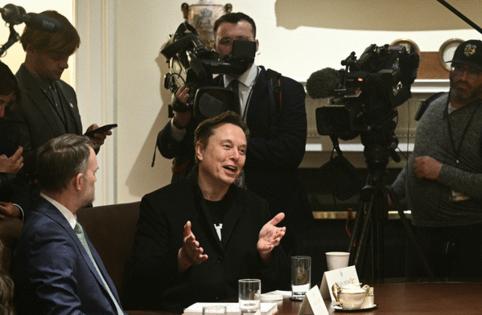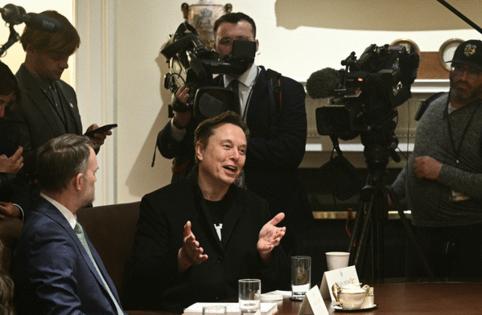Musk must face suit over power as Trump aide, judge says
Published in News & Features
WASHINGTON — Elon Musk will have to face a lawsuit that claims the billionaire wielded illegal power by orchestrating President Donald Trump’s dramatic cuts in federal government jobs and spending, a judge ruled.
U.S. District Judge Tanya Chutkan on Tuesday denied a request by the Justice Department to toss the case filed by Democratic state attorneys general against Musk and the Department of Government Efficiency. But she dismissed a claim against Trump, saying courts can’t limit the actions of a president performing his official duties.
Chutkan ruled the states presented specific enough allegations and preliminary evidence to proceed with claims that Musk was granted the same authority as Trump’s Senate-confirmed cabinet. While Musk has been the public face of DOGE, he’s denied he holds a formal position or has any authority to direct agencies to carry out the president’s cost-cutting agenda. Musk said last month he’ll significantly scale back his DOGE work to be “super focused” on his businesses, including Tesla Inc. and SpaceX.
The judge found that the Trump administration had adopted a “perverse reading” of the U.S. Constitution’s system of checks and balances and appeared “to sanction unlimited executive power.”
“Under this reasoning, the President could authorize an individual to act as a Prime Minister who vetoes, amends, or adopts legislation enacted by Congress, as an Ultimate Justice who unilaterally overrules any decision by the Supreme Court, as a King who exercises preeminent authority over the entire nation, or allow a foreign leader to direct American armed forces,” Chutkan wrote.
A White House spokesperson and representative of the New Mexico attorney general’s office, which is leading the 14-state coalition that sued, did not immediately respond to requests for comment.
Musk and his U.S. DOGE Service have faced a slew of legal challenges since Trump took office in January. In addition to questioning the role of Musk and his DOGE-affiliated staff, some suits are seeking to block their access to agency systems and records that contain vast troves of Americans’ financial and personal information.
While rulings to deny motions to dismiss normally can’t be appealed, the Justice Department could argue for an exception because the case presents significant questions about presidential power and interpreting the U.S. Constitution.
The lawsuit accuses Musk of violating the Constitution’s Appointments Clause, which limits high-level decisions about U.S. agency operations and personnel to officials who are nominated by the president and confirmed by the Senate. The states argued Trump “bypassed” Congress and “unilaterally granted massive, unchecked executive authority to Elon Musk and DOGE to destabilize the government.”
In court papers, the Democratic officials highlighted public statements Trump made about putting Musk in charge and Musk’s comments appearing to take ownership of moves to shutter USAID and carry out a barrage of federal funding cuts, among other things. They argued that he wasn’t simply making recommendations to Senate-confirmed agency heads, but rather was “compelling” and “directing” them to act or “overruling” decisions they’d made.
No ‘formal power’
In urging Chutkan to dismiss the case, Justice Department lawyers argued that even if they conceded Musk had “massive” or even “decisive” influence over U.S. domestic policy, he didn’t have the “formal power to act.” As long as a Senate-confirmed official “takes formal responsibility” for decisions that Musk recommended, there couldn’t be a constitutional violation, the government said.
Chutkan wrote that Musk’s title of “special government employee” might be his “formal classification” but “not necessarily the position he holds.” She said the government had unsuccessfully tried to “minimize” Musk’s role and that the states put forward enough evidence at this stage that he was directing the actions of DOGE-affiliated staff at 17 federal agencies.
The government argued the states lacked standing to file the suit because they couldn’t prove they faced imminent and concrete injuries from Musk and DOGE’s efforts to carry out Trump’s directive to identify waste, fraud and abuse at federal agencies.
But Chutkan again concluded that the states put forward enough evidence for now that their government offices and public institutions were affected by cuts to federal funding and programs that they allege Musk spearheaded. The attorneys general also argued that DOGE staff “created a substantial risk of cybersecurity breaches” by improperly getting access to “sensitive” state data.
Chutkan’s decision comes after the U.S. Court of Appeals for the DC Circuit in March paused her earlier ruling allowing the state attorneys general to demand records and information from Musk and the U.S. DOGE Service. The appeals court had delayed that fight until Chutkan ruled on whether to let the case go forward.
The case is New Mexico v. Musk, 25-cv-429, U.S. District Court, District of Columbia (Washington).
_____
©2025 Bloomberg L.P. Visit bloomberg.com. Distributed by Tribune Content Agency, LLC










Comments